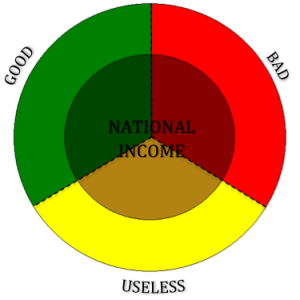Yves here. I’ve sympathetic with the aspirations expressed in Boyce’s piece, but if anything, the measurement fetish is going in the other direction. Both businessmen and economists are obsessed with quantification, which leads to thing that are readily measurable, like transaction data, being assigned more significance than qualitative or hard to gather information. It also leads to data which is developed and derived (think GDP) being treated as being as “solid” because it is expressed as as a single figure, as a data point that is precise, such as the closing price of XYZ Widget’s stock on a particular day (see longer form discussion
here).
Boyce also discusses other distortions in measures of growth that don’t get sufficient attention, such as the
rising prices of positional goods. And rising income disparity makes societies less happy and less healthy, yet it’s become a cause for concern in the economic literature mainly because it is seen as a probably culprit in flagging growth rates.
By James Boyce, professor of economics at the University of Massachusetts, Amherst, and co-founder of Econ4: Economics for People, the Planet, and the Future. His most recent book is Economics, the Environment and Our Common Wealth. Cross posted from Triple Crisis.
Average national income is a notoriously imperfect measure of the average person’s well-being. The 2010
BP oil spill in the Gulf of Mexico – with clean-up and damage costs of $90 billion – added about $300 to the average American’s “income.” But it added nothing to our well-being. The world’s
most expensive prison system, costing almost $40 billion per year, adds another $125 per person. This doesn’t make us better-off than people living in countries that don’t incarcerate
one in every 100 adults.
Of course, national income includes many good things, too. Growing food and building homes add to national income. So does public spending on education and health care. Unlike oil spills and jails, these really do add to our well-being.
National Income: The Good, the Bad, and the Useless

No comments:
Post a Comment